Travel & Tourism Law: Regulations, Ethics, and Responsibilities
VerifiedAdded on 2024/05/31
|26
|4762
|275
Report
AI Summary
This report provides a comprehensive analysis of the legal and ethical aspects of the travel and tourism sector. It begins by explaining the legal and regulatory framework, including surface, sea, and air transport laws related to passenger carriage. The report then evaluates the impact of health, safety, and security legislation, as well as legislation related to equality within the sector. Contract and consumer protection legislation are examined in relation to travel and tourism customers, focusing on their rights and protections. Finally, the report analyzes ethical dilemmas faced by the industry and explores the Corporate Social Responsibility (CSR) of travel and tourism businesses, highlighting their role in contributing to the community. This document is available on Desklib, a platform offering a wide range of study tools and resources for students.
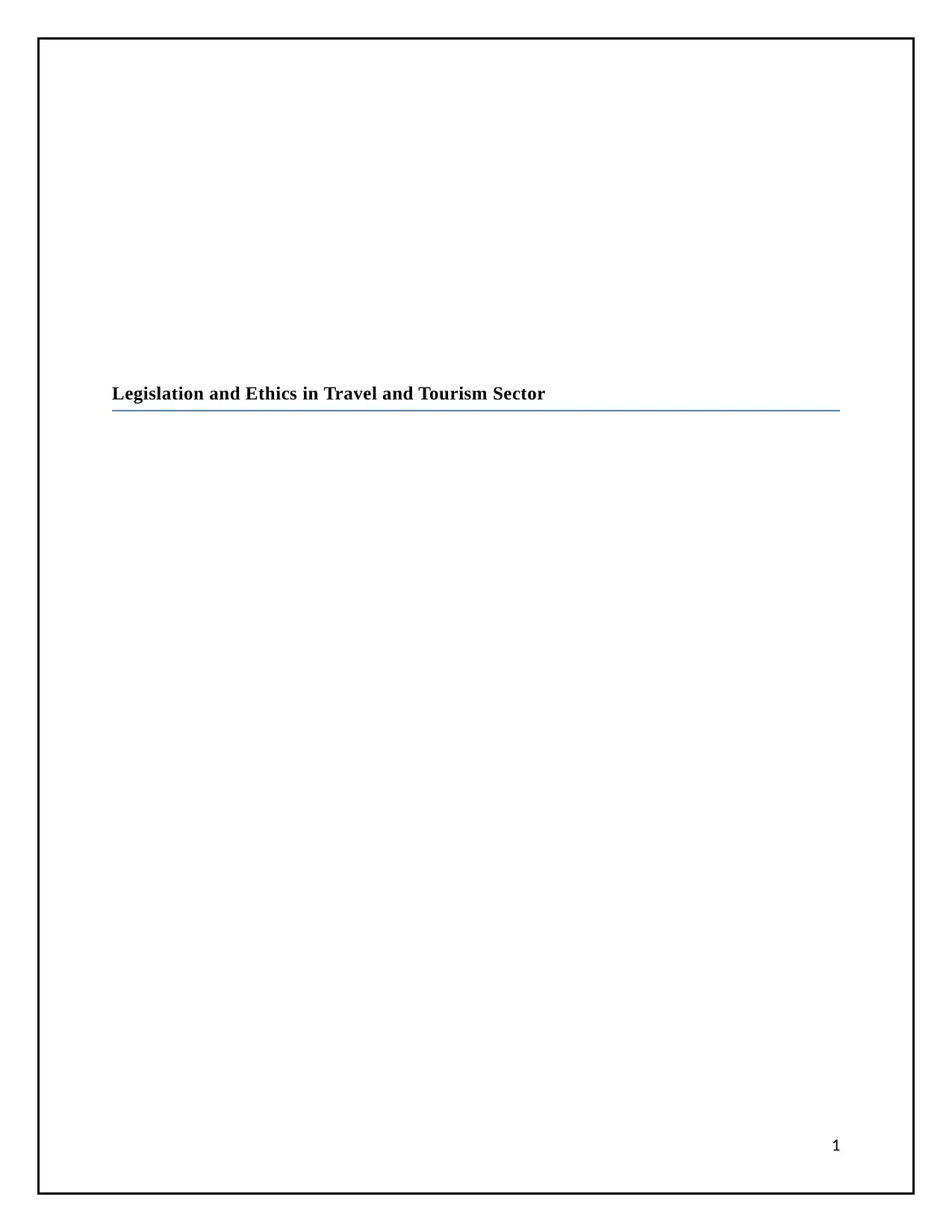
Legislation and Ethics in Travel and Tourism Sector
1
1
Paraphrase This Document
Need a fresh take? Get an instant paraphrase of this document with our AI Paraphraser
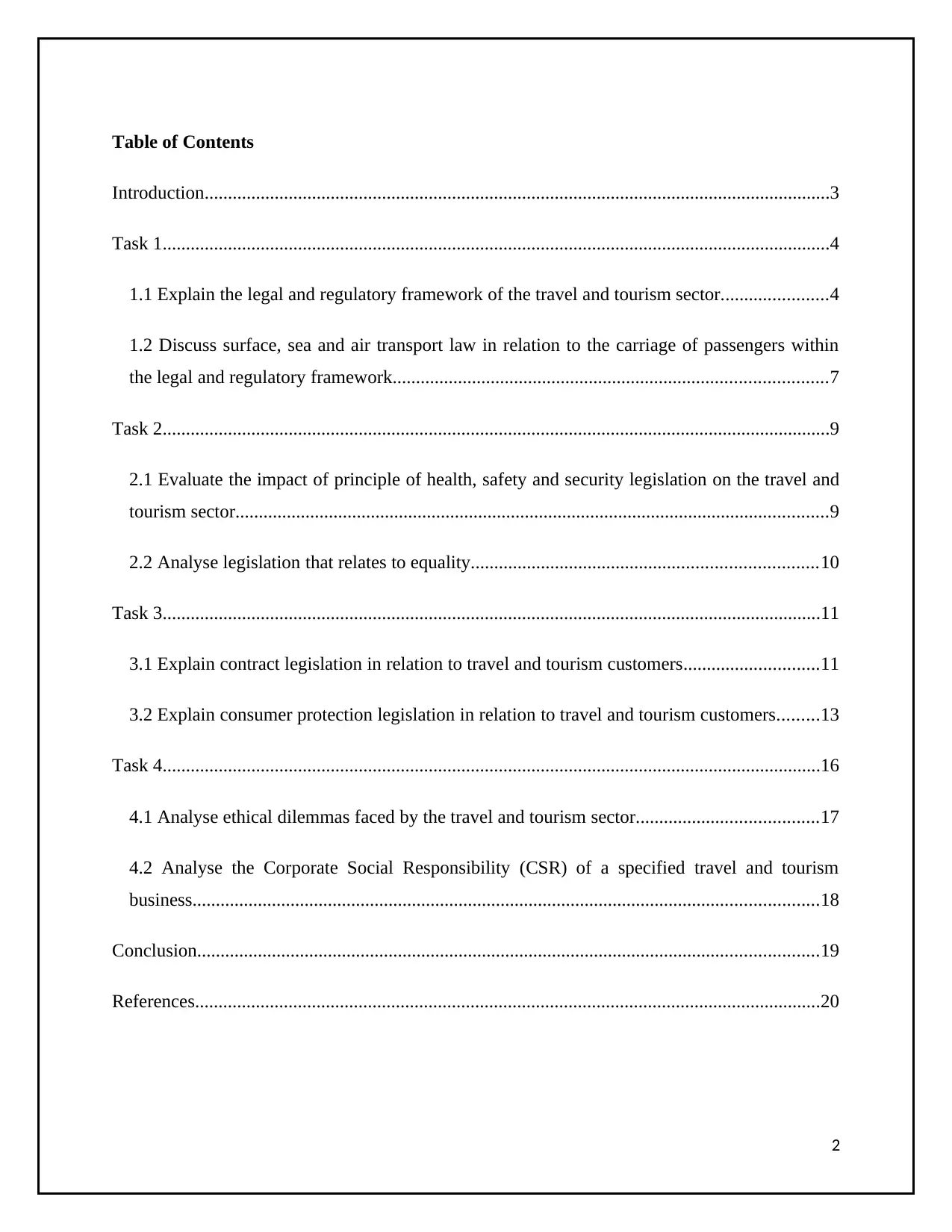
Table of Contents
Introduction......................................................................................................................................3
Task 1...............................................................................................................................................4
1.1 Explain the legal and regulatory framework of the travel and tourism sector.......................4
1.2 Discuss surface, sea and air transport law in relation to the carriage of passengers within
the legal and regulatory framework.............................................................................................7
Task 2...............................................................................................................................................9
2.1 Evaluate the impact of principle of health, safety and security legislation on the travel and
tourism sector...............................................................................................................................9
2.2 Analyse legislation that relates to equality..........................................................................10
Task 3.............................................................................................................................................11
3.1 Explain contract legislation in relation to travel and tourism customers.............................11
3.2 Explain consumer protection legislation in relation to travel and tourism customers.........13
Task 4.............................................................................................................................................16
4.1 Analyse ethical dilemmas faced by the travel and tourism sector.......................................17
4.2 Analyse the Corporate Social Responsibility (CSR) of a specified travel and tourism
business......................................................................................................................................18
Conclusion.....................................................................................................................................19
References......................................................................................................................................20
2
Introduction......................................................................................................................................3
Task 1...............................................................................................................................................4
1.1 Explain the legal and regulatory framework of the travel and tourism sector.......................4
1.2 Discuss surface, sea and air transport law in relation to the carriage of passengers within
the legal and regulatory framework.............................................................................................7
Task 2...............................................................................................................................................9
2.1 Evaluate the impact of principle of health, safety and security legislation on the travel and
tourism sector...............................................................................................................................9
2.2 Analyse legislation that relates to equality..........................................................................10
Task 3.............................................................................................................................................11
3.1 Explain contract legislation in relation to travel and tourism customers.............................11
3.2 Explain consumer protection legislation in relation to travel and tourism customers.........13
Task 4.............................................................................................................................................16
4.1 Analyse ethical dilemmas faced by the travel and tourism sector.......................................17
4.2 Analyse the Corporate Social Responsibility (CSR) of a specified travel and tourism
business......................................................................................................................................18
Conclusion.....................................................................................................................................19
References......................................................................................................................................20
2

3
⊘ This is a preview!⊘
Do you want full access?
Subscribe today to unlock all pages.

Trusted by 1+ million students worldwide
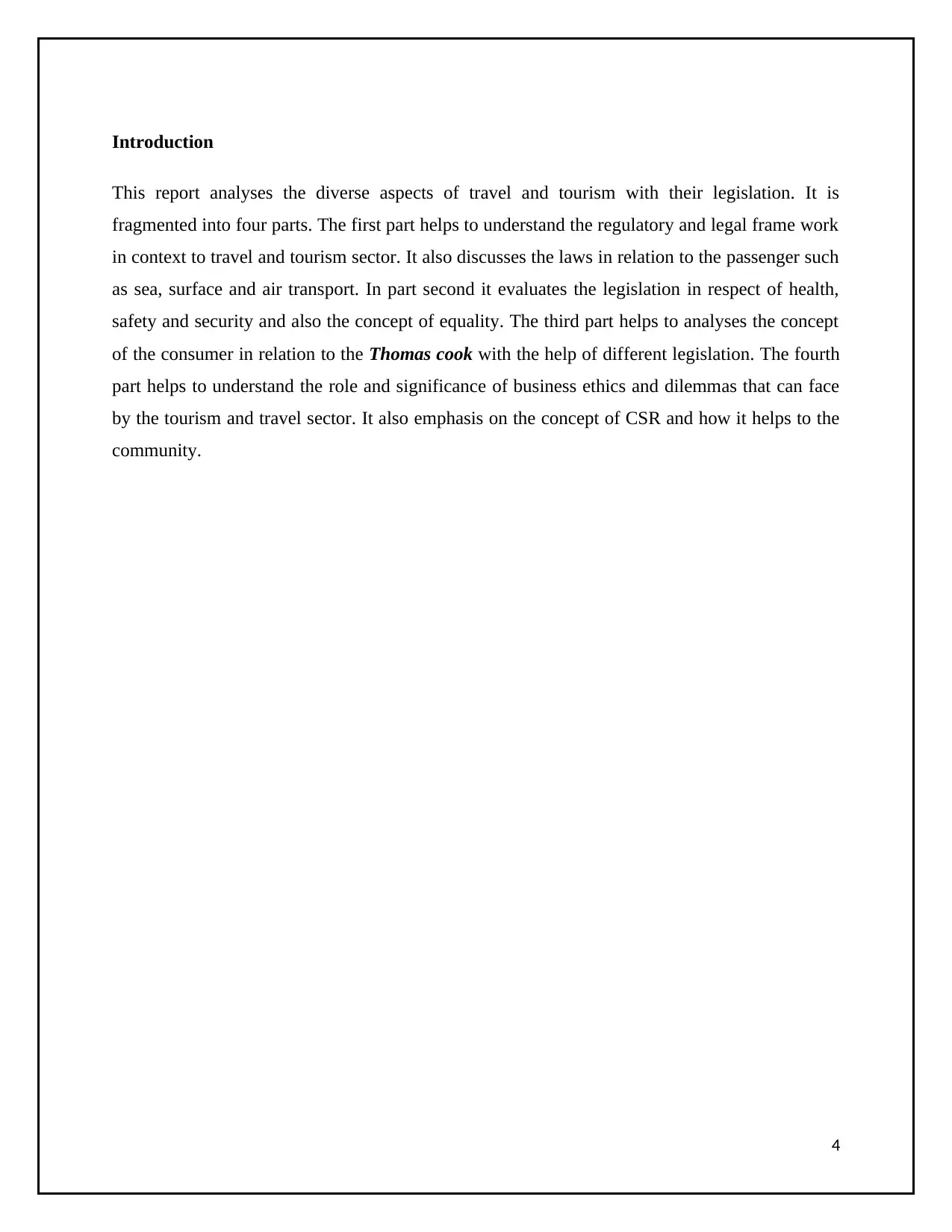
Introduction
This report analyses the diverse aspects of travel and tourism with their legislation. It is
fragmented into four parts. The first part helps to understand the regulatory and legal frame work
in context to travel and tourism sector. It also discusses the laws in relation to the passenger such
as sea, surface and air transport. In part second it evaluates the legislation in respect of health,
safety and security and also the concept of equality. The third part helps to analyses the concept
of the consumer in relation to the Thomas cook with the help of different legislation. The fourth
part helps to understand the role and significance of business ethics and dilemmas that can face
by the tourism and travel sector. It also emphasis on the concept of CSR and how it helps to the
community.
4
This report analyses the diverse aspects of travel and tourism with their legislation. It is
fragmented into four parts. The first part helps to understand the regulatory and legal frame work
in context to travel and tourism sector. It also discusses the laws in relation to the passenger such
as sea, surface and air transport. In part second it evaluates the legislation in respect of health,
safety and security and also the concept of equality. The third part helps to analyses the concept
of the consumer in relation to the Thomas cook with the help of different legislation. The fourth
part helps to understand the role and significance of business ethics and dilemmas that can face
by the tourism and travel sector. It also emphasis on the concept of CSR and how it helps to the
community.
4
Paraphrase This Document
Need a fresh take? Get an instant paraphrase of this document with our AI Paraphraser
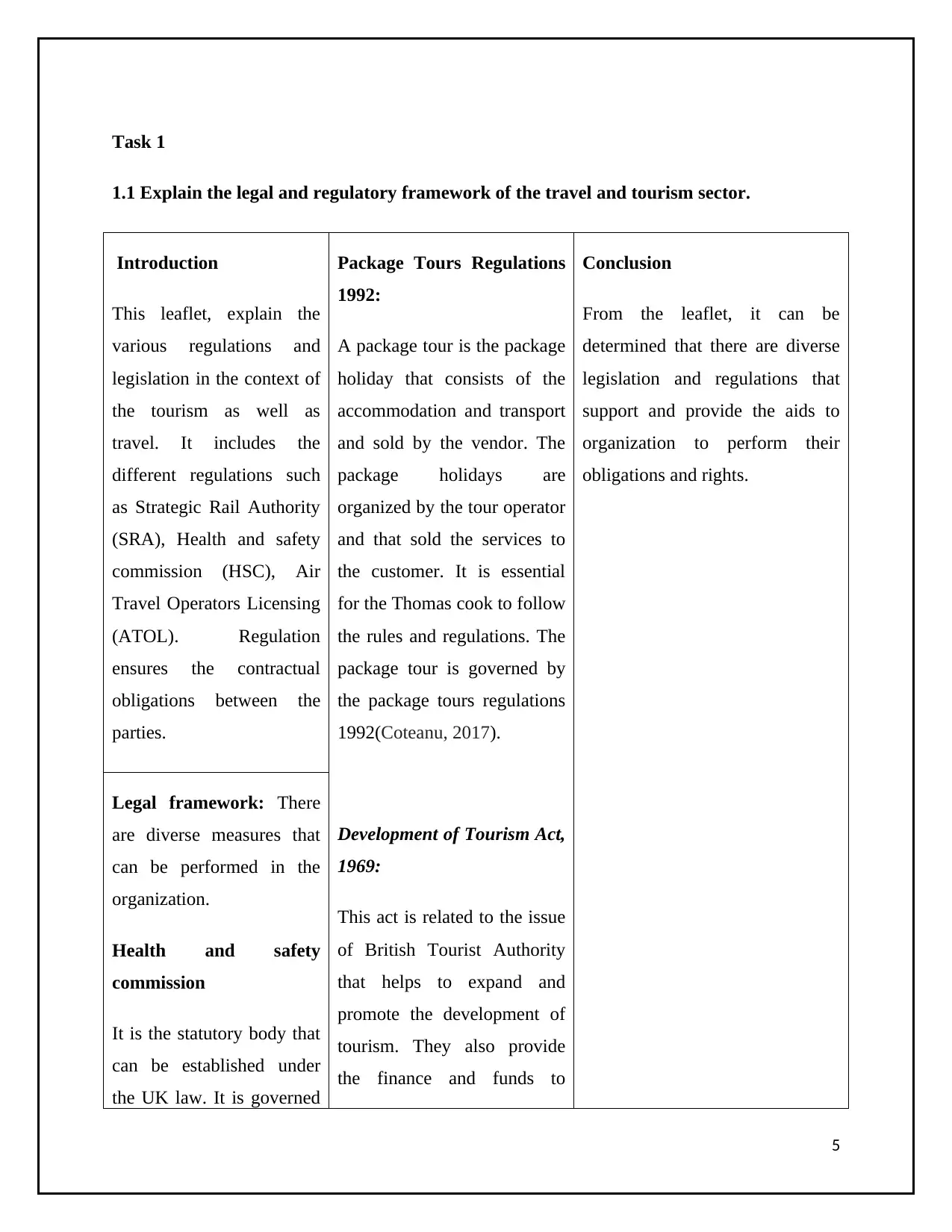
Task 1
1.1 Explain the legal and regulatory framework of the travel and tourism sector.
Introduction
This leaflet, explain the
various regulations and
legislation in the context of
the tourism as well as
travel. It includes the
different regulations such
as Strategic Rail Authority
(SRA), Health and safety
commission (HSC), Air
Travel Operators Licensing
(ATOL). Regulation
ensures the contractual
obligations between the
parties.
Package Tours Regulations
1992:
A package tour is the package
holiday that consists of the
accommodation and transport
and sold by the vendor. The
package holidays are
organized by the tour operator
and that sold the services to
the customer. It is essential
for the Thomas cook to follow
the rules and regulations. The
package tour is governed by
the package tours regulations
1992(Coteanu, 2017).
Development of Tourism Act,
1969:
This act is related to the issue
of British Tourist Authority
that helps to expand and
promote the development of
tourism. They also provide
the finance and funds to
Conclusion
From the leaflet, it can be
determined that there are diverse
legislation and regulations that
support and provide the aids to
organization to perform their
obligations and rights.
Legal framework: There
are diverse measures that
can be performed in the
organization.
Health and safety
commission
It is the statutory body that
can be established under
the UK law. It is governed
5
1.1 Explain the legal and regulatory framework of the travel and tourism sector.
Introduction
This leaflet, explain the
various regulations and
legislation in the context of
the tourism as well as
travel. It includes the
different regulations such
as Strategic Rail Authority
(SRA), Health and safety
commission (HSC), Air
Travel Operators Licensing
(ATOL). Regulation
ensures the contractual
obligations between the
parties.
Package Tours Regulations
1992:
A package tour is the package
holiday that consists of the
accommodation and transport
and sold by the vendor. The
package holidays are
organized by the tour operator
and that sold the services to
the customer. It is essential
for the Thomas cook to follow
the rules and regulations. The
package tour is governed by
the package tours regulations
1992(Coteanu, 2017).
Development of Tourism Act,
1969:
This act is related to the issue
of British Tourist Authority
that helps to expand and
promote the development of
tourism. They also provide
the finance and funds to
Conclusion
From the leaflet, it can be
determined that there are diverse
legislation and regulations that
support and provide the aids to
organization to perform their
obligations and rights.
Legal framework: There
are diverse measures that
can be performed in the
organization.
Health and safety
commission
It is the statutory body that
can be established under
the UK law. It is governed
5
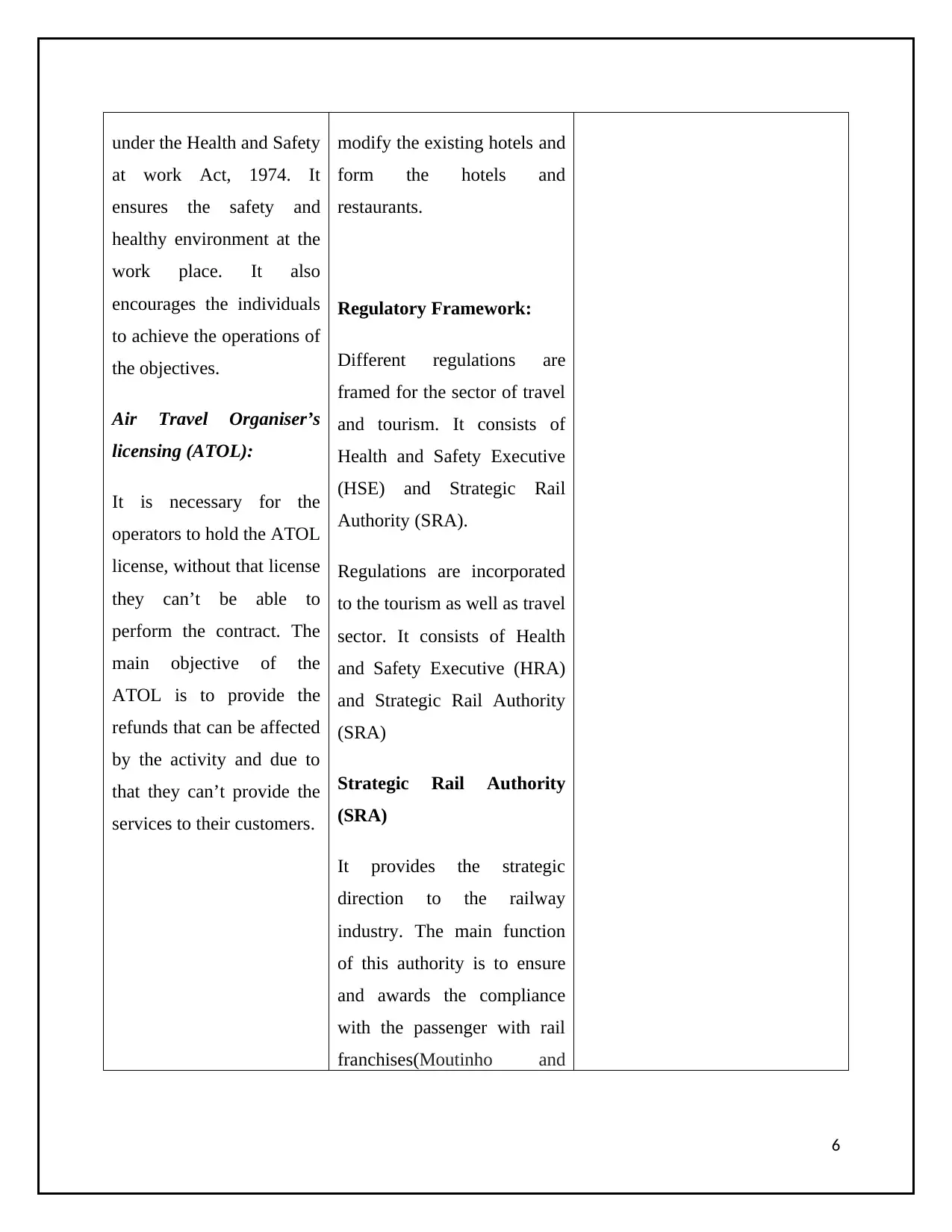
under the Health and Safety
at work Act, 1974. It
ensures the safety and
healthy environment at the
work place. It also
encourages the individuals
to achieve the operations of
the objectives.
Air Travel Organiser’s
licensing (ATOL):
It is necessary for the
operators to hold the ATOL
license, without that license
they can’t be able to
perform the contract. The
main objective of the
ATOL is to provide the
refunds that can be affected
by the activity and due to
that they can’t provide the
services to their customers.
modify the existing hotels and
form the hotels and
restaurants.
Regulatory Framework:
Different regulations are
framed for the sector of travel
and tourism. It consists of
Health and Safety Executive
(HSE) and Strategic Rail
Authority (SRA).
Regulations are incorporated
to the tourism as well as travel
sector. It consists of Health
and Safety Executive (HRA)
and Strategic Rail Authority
(SRA)
Strategic Rail Authority
(SRA)
It provides the strategic
direction to the railway
industry. The main function
of this authority is to ensure
and awards the compliance
with the passenger with rail
franchises(Moutinho and
6
at work Act, 1974. It
ensures the safety and
healthy environment at the
work place. It also
encourages the individuals
to achieve the operations of
the objectives.
Air Travel Organiser’s
licensing (ATOL):
It is necessary for the
operators to hold the ATOL
license, without that license
they can’t be able to
perform the contract. The
main objective of the
ATOL is to provide the
refunds that can be affected
by the activity and due to
that they can’t provide the
services to their customers.
modify the existing hotels and
form the hotels and
restaurants.
Regulatory Framework:
Different regulations are
framed for the sector of travel
and tourism. It consists of
Health and Safety Executive
(HSE) and Strategic Rail
Authority (SRA).
Regulations are incorporated
to the tourism as well as travel
sector. It consists of Health
and Safety Executive (HRA)
and Strategic Rail Authority
(SRA)
Strategic Rail Authority
(SRA)
It provides the strategic
direction to the railway
industry. The main function
of this authority is to ensure
and awards the compliance
with the passenger with rail
franchises(Moutinho and
6
⊘ This is a preview!⊘
Do you want full access?
Subscribe today to unlock all pages.

Trusted by 1+ million students worldwide
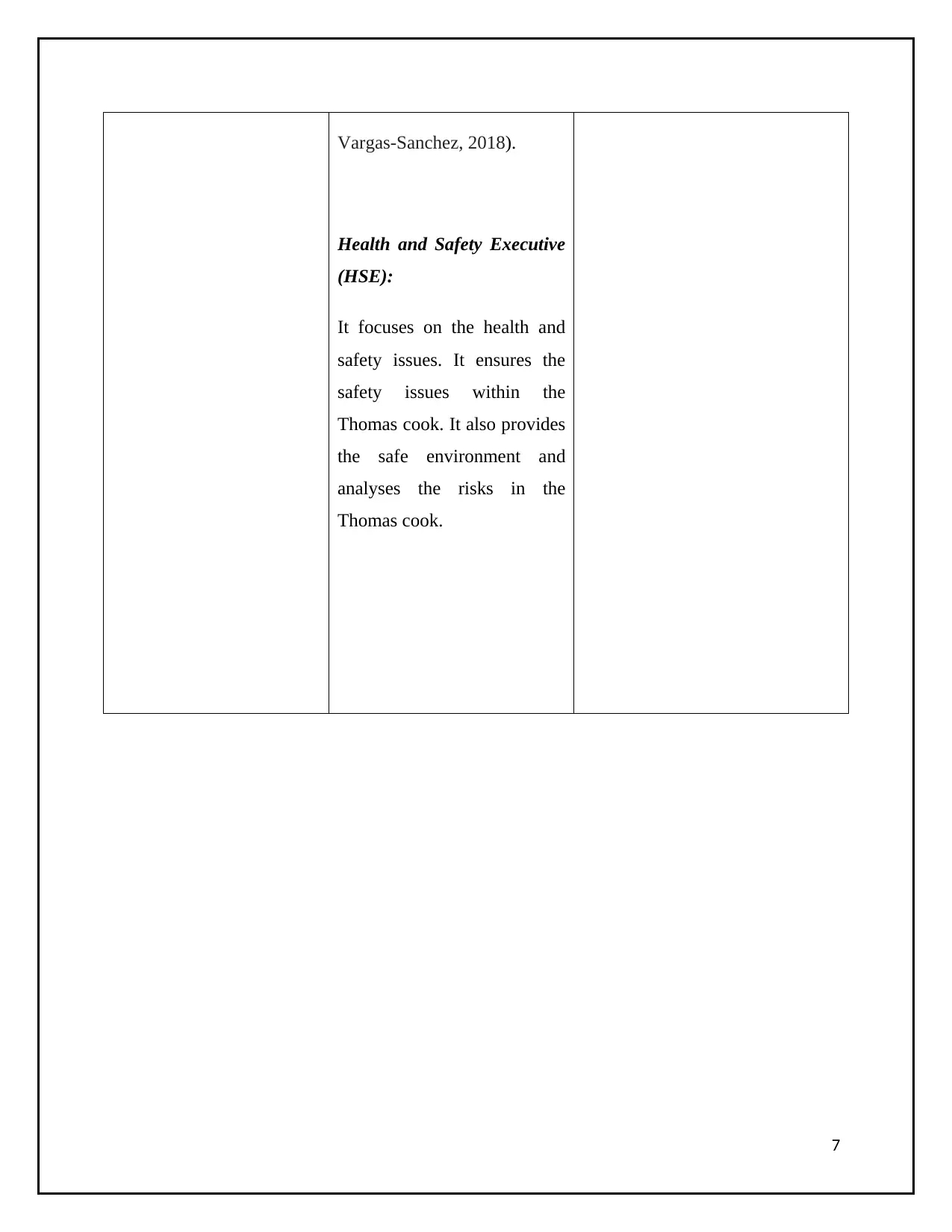
Vargas-Sanchez, 2018).
Health and Safety Executive
(HSE):
It focuses on the health and
safety issues. It ensures the
safety issues within the
Thomas cook. It also provides
the safe environment and
analyses the risks in the
Thomas cook.
7
Health and Safety Executive
(HSE):
It focuses on the health and
safety issues. It ensures the
safety issues within the
Thomas cook. It also provides
the safe environment and
analyses the risks in the
Thomas cook.
7
Paraphrase This Document
Need a fresh take? Get an instant paraphrase of this document with our AI Paraphraser
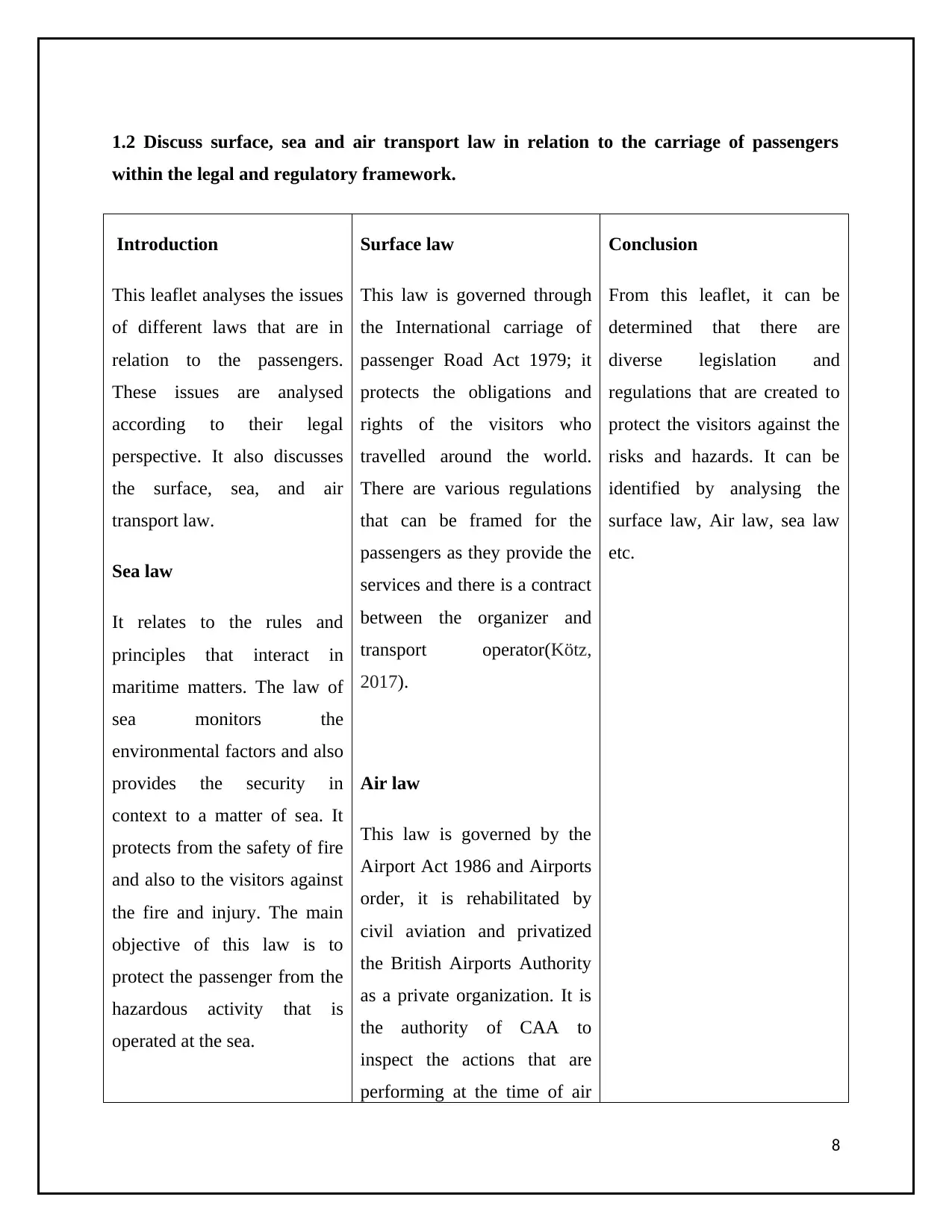
1.2 Discuss surface, sea and air transport law in relation to the carriage of passengers
within the legal and regulatory framework.
Introduction
This leaflet analyses the issues
of different laws that are in
relation to the passengers.
These issues are analysed
according to their legal
perspective. It also discusses
the surface, sea, and air
transport law.
Sea law
It relates to the rules and
principles that interact in
maritime matters. The law of
sea monitors the
environmental factors and also
provides the security in
context to a matter of sea. It
protects from the safety of fire
and also to the visitors against
the fire and injury. The main
objective of this law is to
protect the passenger from the
hazardous activity that is
operated at the sea.
Surface law
This law is governed through
the International carriage of
passenger Road Act 1979; it
protects the obligations and
rights of the visitors who
travelled around the world.
There are various regulations
that can be framed for the
passengers as they provide the
services and there is a contract
between the organizer and
transport operator(Kötz,
2017).
Air law
This law is governed by the
Airport Act 1986 and Airports
order, it is rehabilitated by
civil aviation and privatized
the British Airports Authority
as a private organization. It is
the authority of CAA to
inspect the actions that are
performing at the time of air
Conclusion
From this leaflet, it can be
determined that there are
diverse legislation and
regulations that are created to
protect the visitors against the
risks and hazards. It can be
identified by analysing the
surface law, Air law, sea law
etc.
8
within the legal and regulatory framework.
Introduction
This leaflet analyses the issues
of different laws that are in
relation to the passengers.
These issues are analysed
according to their legal
perspective. It also discusses
the surface, sea, and air
transport law.
Sea law
It relates to the rules and
principles that interact in
maritime matters. The law of
sea monitors the
environmental factors and also
provides the security in
context to a matter of sea. It
protects from the safety of fire
and also to the visitors against
the fire and injury. The main
objective of this law is to
protect the passenger from the
hazardous activity that is
operated at the sea.
Surface law
This law is governed through
the International carriage of
passenger Road Act 1979; it
protects the obligations and
rights of the visitors who
travelled around the world.
There are various regulations
that can be framed for the
passengers as they provide the
services and there is a contract
between the organizer and
transport operator(Kötz,
2017).
Air law
This law is governed by the
Airport Act 1986 and Airports
order, it is rehabilitated by
civil aviation and privatized
the British Airports Authority
as a private organization. It is
the authority of CAA to
inspect the actions that are
performing at the time of air
Conclusion
From this leaflet, it can be
determined that there are
diverse legislation and
regulations that are created to
protect the visitors against the
risks and hazards. It can be
identified by analysing the
surface law, Air law, sea law
etc.
8
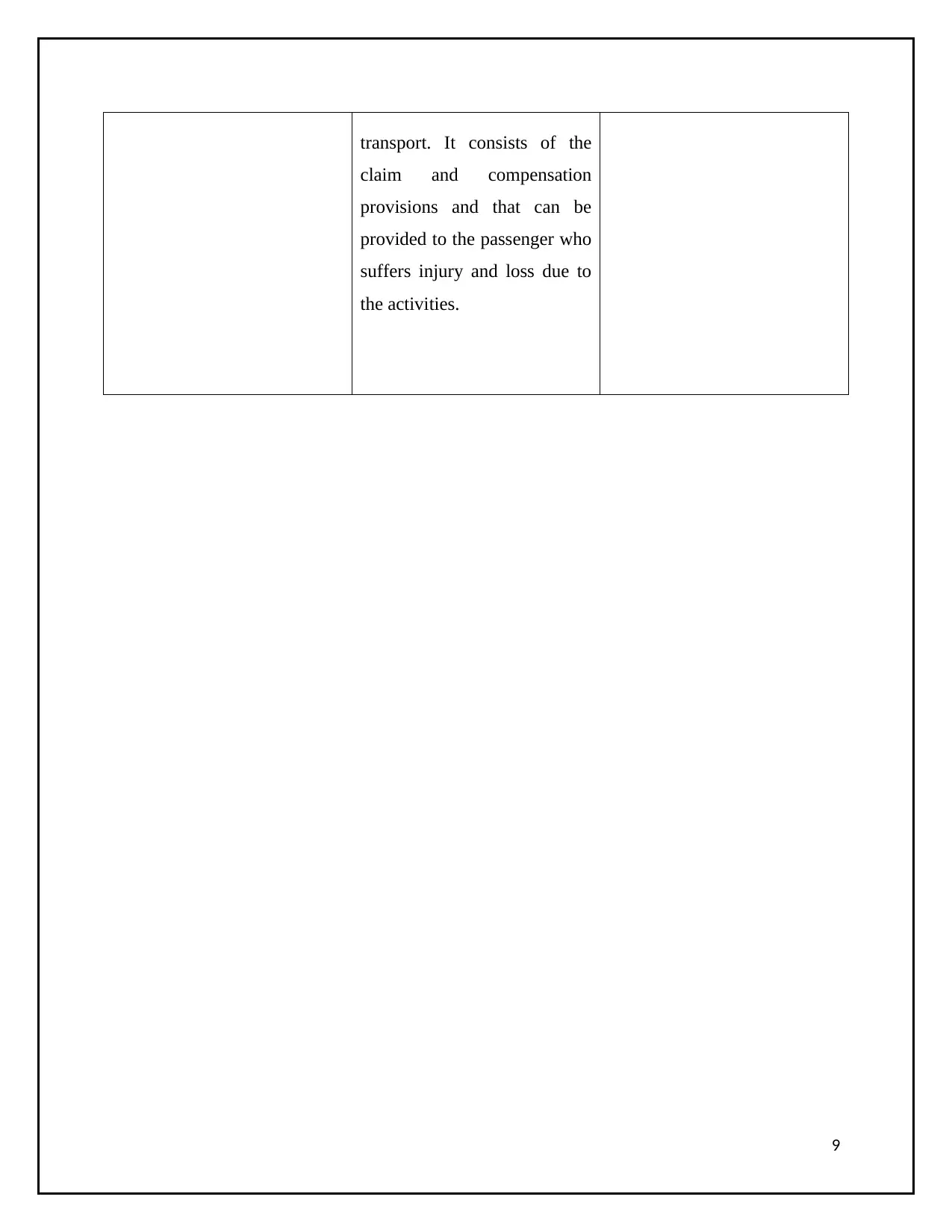
transport. It consists of the
claim and compensation
provisions and that can be
provided to the passenger who
suffers injury and loss due to
the activities.
9
claim and compensation
provisions and that can be
provided to the passenger who
suffers injury and loss due to
the activities.
9
⊘ This is a preview!⊘
Do you want full access?
Subscribe today to unlock all pages.

Trusted by 1+ million students worldwide
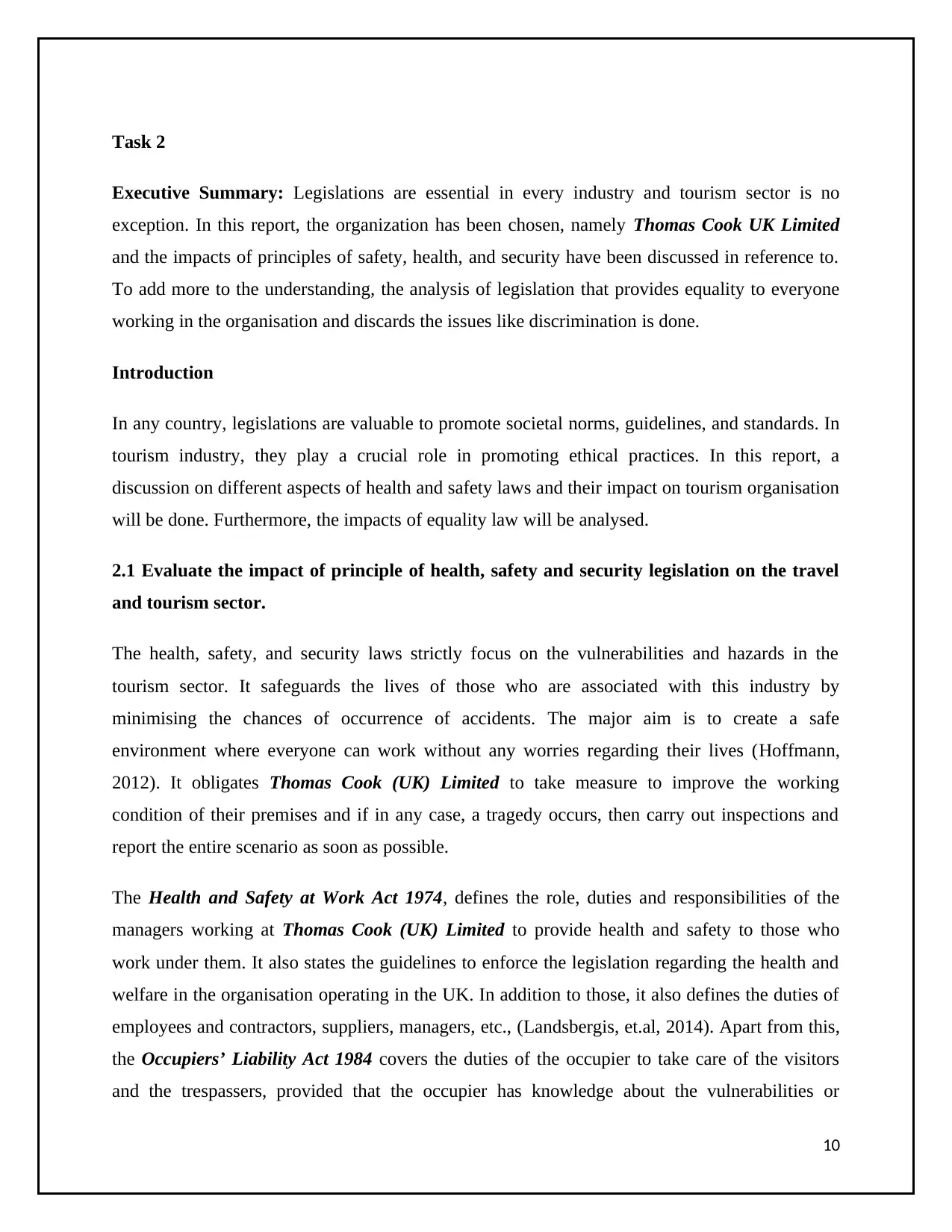
Task 2
Executive Summary: Legislations are essential in every industry and tourism sector is no
exception. In this report, the organization has been chosen, namely Thomas Cook UK Limited
and the impacts of principles of safety, health, and security have been discussed in reference to.
To add more to the understanding, the analysis of legislation that provides equality to everyone
working in the organisation and discards the issues like discrimination is done.
Introduction
In any country, legislations are valuable to promote societal norms, guidelines, and standards. In
tourism industry, they play a crucial role in promoting ethical practices. In this report, a
discussion on different aspects of health and safety laws and their impact on tourism organisation
will be done. Furthermore, the impacts of equality law will be analysed.
2.1 Evaluate the impact of principle of health, safety and security legislation on the travel
and tourism sector.
The health, safety, and security laws strictly focus on the vulnerabilities and hazards in the
tourism sector. It safeguards the lives of those who are associated with this industry by
minimising the chances of occurrence of accidents. The major aim is to create a safe
environment where everyone can work without any worries regarding their lives (Hoffmann,
2012). It obligates Thomas Cook (UK) Limited to take measure to improve the working
condition of their premises and if in any case, a tragedy occurs, then carry out inspections and
report the entire scenario as soon as possible.
The Health and Safety at Work Act 1974, defines the role, duties and responsibilities of the
managers working at Thomas Cook (UK) Limited to provide health and safety to those who
work under them. It also states the guidelines to enforce the legislation regarding the health and
welfare in the organisation operating in the UK. In addition to those, it also defines the duties of
employees and contractors, suppliers, managers, etc., (Landsbergis, et.al, 2014). Apart from this,
the Occupiers’ Liability Act 1984 covers the duties of the occupier to take care of the visitors
and the trespassers, provided that the occupier has knowledge about the vulnerabilities or
10
Executive Summary: Legislations are essential in every industry and tourism sector is no
exception. In this report, the organization has been chosen, namely Thomas Cook UK Limited
and the impacts of principles of safety, health, and security have been discussed in reference to.
To add more to the understanding, the analysis of legislation that provides equality to everyone
working in the organisation and discards the issues like discrimination is done.
Introduction
In any country, legislations are valuable to promote societal norms, guidelines, and standards. In
tourism industry, they play a crucial role in promoting ethical practices. In this report, a
discussion on different aspects of health and safety laws and their impact on tourism organisation
will be done. Furthermore, the impacts of equality law will be analysed.
2.1 Evaluate the impact of principle of health, safety and security legislation on the travel
and tourism sector.
The health, safety, and security laws strictly focus on the vulnerabilities and hazards in the
tourism sector. It safeguards the lives of those who are associated with this industry by
minimising the chances of occurrence of accidents. The major aim is to create a safe
environment where everyone can work without any worries regarding their lives (Hoffmann,
2012). It obligates Thomas Cook (UK) Limited to take measure to improve the working
condition of their premises and if in any case, a tragedy occurs, then carry out inspections and
report the entire scenario as soon as possible.
The Health and Safety at Work Act 1974, defines the role, duties and responsibilities of the
managers working at Thomas Cook (UK) Limited to provide health and safety to those who
work under them. It also states the guidelines to enforce the legislation regarding the health and
welfare in the organisation operating in the UK. In addition to those, it also defines the duties of
employees and contractors, suppliers, managers, etc., (Landsbergis, et.al, 2014). Apart from this,
the Occupiers’ Liability Act 1984 covers the duties of the occupier to take care of the visitors
and the trespassers, provided that the occupier has knowledge about the vulnerabilities or
10
Paraphrase This Document
Need a fresh take? Get an instant paraphrase of this document with our AI Paraphraser
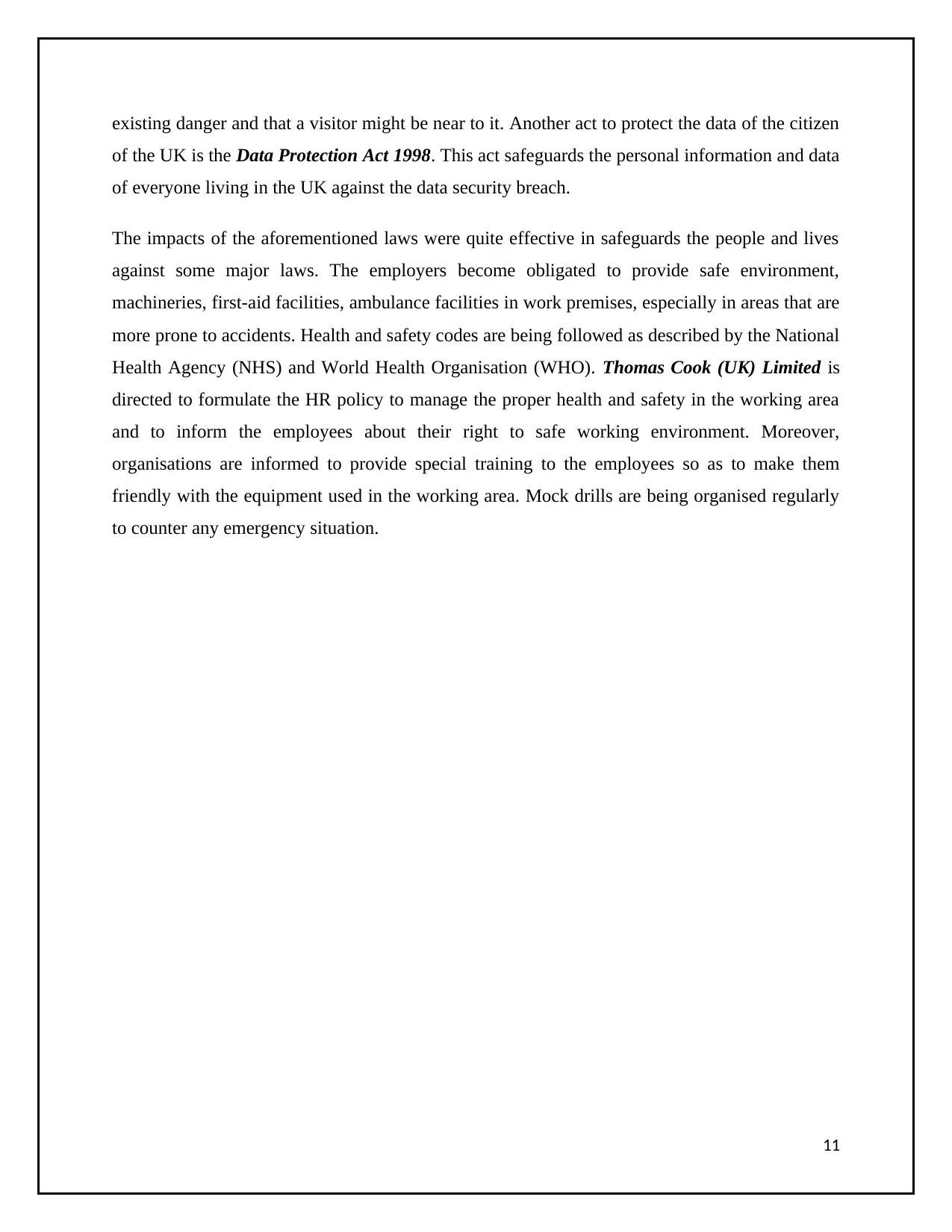
existing danger and that a visitor might be near to it. Another act to protect the data of the citizen
of the UK is the Data Protection Act 1998. This act safeguards the personal information and data
of everyone living in the UK against the data security breach.
The impacts of the aforementioned laws were quite effective in safeguards the people and lives
against some major laws. The employers become obligated to provide safe environment,
machineries, first-aid facilities, ambulance facilities in work premises, especially in areas that are
more prone to accidents. Health and safety codes are being followed as described by the National
Health Agency (NHS) and World Health Organisation (WHO). Thomas Cook (UK) Limited is
directed to formulate the HR policy to manage the proper health and safety in the working area
and to inform the employees about their right to safe working environment. Moreover,
organisations are informed to provide special training to the employees so as to make them
friendly with the equipment used in the working area. Mock drills are being organised regularly
to counter any emergency situation.
11
of the UK is the Data Protection Act 1998. This act safeguards the personal information and data
of everyone living in the UK against the data security breach.
The impacts of the aforementioned laws were quite effective in safeguards the people and lives
against some major laws. The employers become obligated to provide safe environment,
machineries, first-aid facilities, ambulance facilities in work premises, especially in areas that are
more prone to accidents. Health and safety codes are being followed as described by the National
Health Agency (NHS) and World Health Organisation (WHO). Thomas Cook (UK) Limited is
directed to formulate the HR policy to manage the proper health and safety in the working area
and to inform the employees about their right to safe working environment. Moreover,
organisations are informed to provide special training to the employees so as to make them
friendly with the equipment used in the working area. Mock drills are being organised regularly
to counter any emergency situation.
11
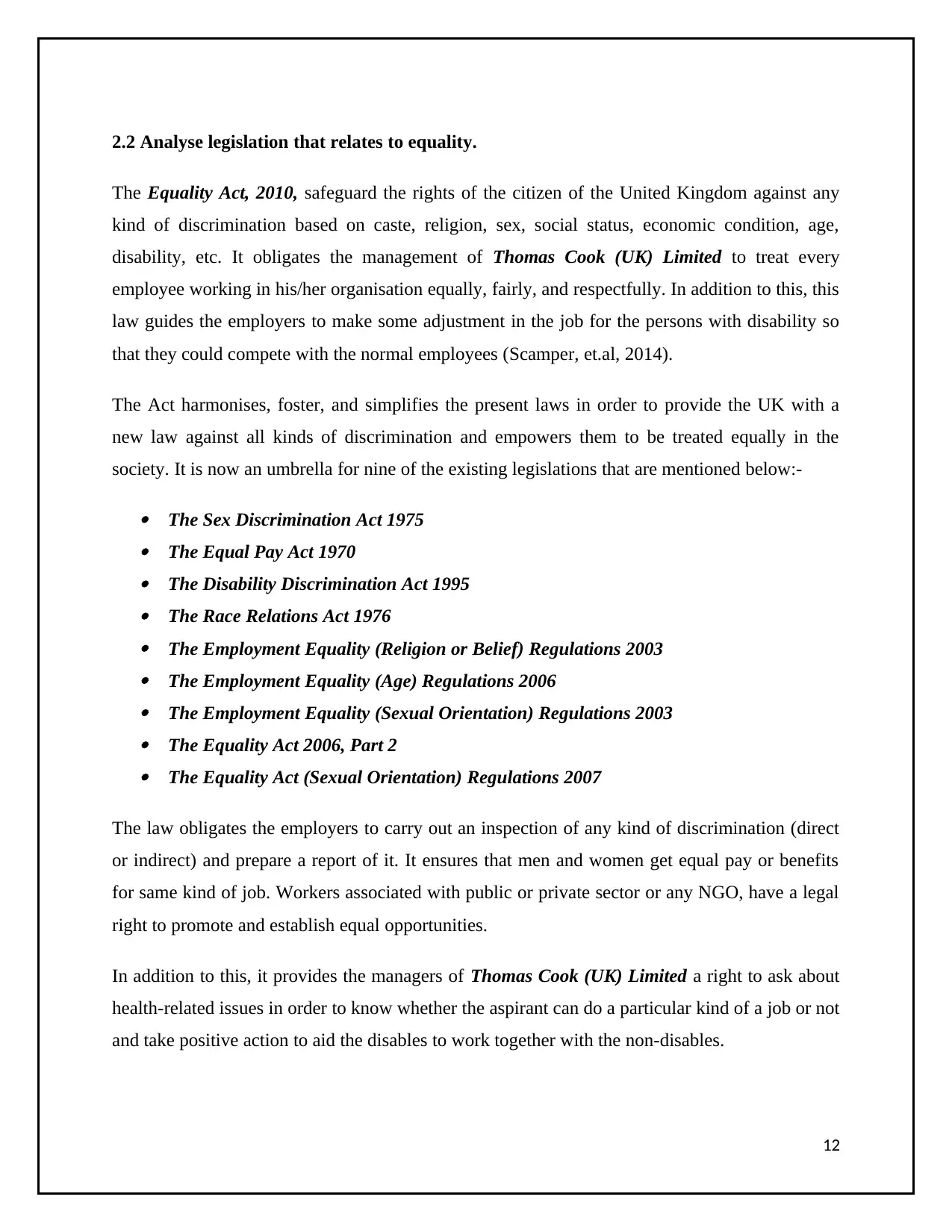
2.2 Analyse legislation that relates to equality.
The Equality Act, 2010, safeguard the rights of the citizen of the United Kingdom against any
kind of discrimination based on caste, religion, sex, social status, economic condition, age,
disability, etc. It obligates the management of Thomas Cook (UK) Limited to treat every
employee working in his/her organisation equally, fairly, and respectfully. In addition to this, this
law guides the employers to make some adjustment in the job for the persons with disability so
that they could compete with the normal employees (Scamper, et.al, 2014).
The Act harmonises, foster, and simplifies the present laws in order to provide the UK with a
new law against all kinds of discrimination and empowers them to be treated equally in the
society. It is now an umbrella for nine of the existing legislations that are mentioned below:-
The Sex Discrimination Act 1975 The Equal Pay Act 1970 The Disability Discrimination Act 1995 The Race Relations Act 1976 The Employment Equality (Religion or Belief) Regulations 2003 The Employment Equality (Age) Regulations 2006 The Employment Equality (Sexual Orientation) Regulations 2003 The Equality Act 2006, Part 2 The Equality Act (Sexual Orientation) Regulations 2007
The law obligates the employers to carry out an inspection of any kind of discrimination (direct
or indirect) and prepare a report of it. It ensures that men and women get equal pay or benefits
for same kind of job. Workers associated with public or private sector or any NGO, have a legal
right to promote and establish equal opportunities.
In addition to this, it provides the managers of Thomas Cook (UK) Limited a right to ask about
health-related issues in order to know whether the aspirant can do a particular kind of a job or not
and take positive action to aid the disables to work together with the non-disables.
12
The Equality Act, 2010, safeguard the rights of the citizen of the United Kingdom against any
kind of discrimination based on caste, religion, sex, social status, economic condition, age,
disability, etc. It obligates the management of Thomas Cook (UK) Limited to treat every
employee working in his/her organisation equally, fairly, and respectfully. In addition to this, this
law guides the employers to make some adjustment in the job for the persons with disability so
that they could compete with the normal employees (Scamper, et.al, 2014).
The Act harmonises, foster, and simplifies the present laws in order to provide the UK with a
new law against all kinds of discrimination and empowers them to be treated equally in the
society. It is now an umbrella for nine of the existing legislations that are mentioned below:-
The Sex Discrimination Act 1975 The Equal Pay Act 1970 The Disability Discrimination Act 1995 The Race Relations Act 1976 The Employment Equality (Religion or Belief) Regulations 2003 The Employment Equality (Age) Regulations 2006 The Employment Equality (Sexual Orientation) Regulations 2003 The Equality Act 2006, Part 2 The Equality Act (Sexual Orientation) Regulations 2007
The law obligates the employers to carry out an inspection of any kind of discrimination (direct
or indirect) and prepare a report of it. It ensures that men and women get equal pay or benefits
for same kind of job. Workers associated with public or private sector or any NGO, have a legal
right to promote and establish equal opportunities.
In addition to this, it provides the managers of Thomas Cook (UK) Limited a right to ask about
health-related issues in order to know whether the aspirant can do a particular kind of a job or not
and take positive action to aid the disables to work together with the non-disables.
12
⊘ This is a preview!⊘
Do you want full access?
Subscribe today to unlock all pages.

Trusted by 1+ million students worldwide
1 out of 26
Related Documents
Your All-in-One AI-Powered Toolkit for Academic Success.
+13062052269
info@desklib.com
Available 24*7 on WhatsApp / Email
![[object Object]](/_next/static/media/star-bottom.7253800d.svg)
Unlock your academic potential
Copyright © 2020–2026 A2Z Services. All Rights Reserved. Developed and managed by ZUCOL.




